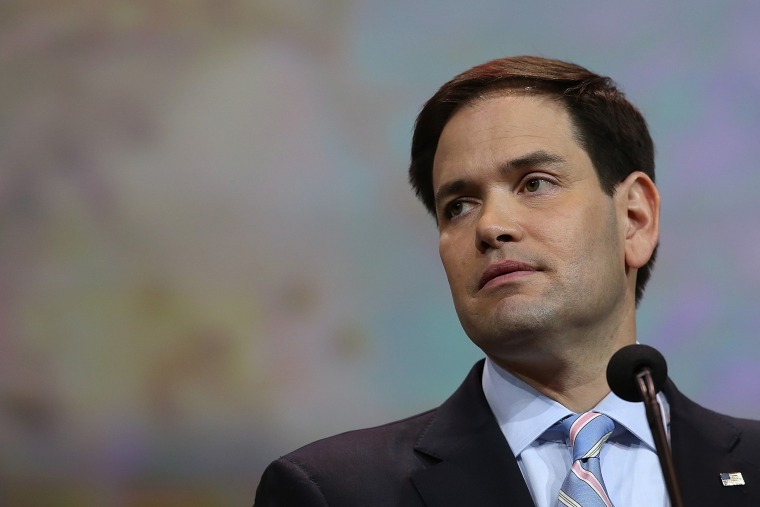The status quo for Sen. Marco Rubio (R-Fla.) is actually quite comfortable. He's a U.S. senator from one of the nation's largest states, where he enjoys favorable support. The Florida Republican is on the committees he likes; he gets plenty of attention from the Beltway media; and he's a young, 43-year-old politician who'd probably be able to stay in this cushy position for the next several decades.
But later today, Rubio will put it all on the line for a chance at the White House.
Sen. Marco Rubio (R-Flo.) told donors Monday morning that he is running for president in 2016 and that he is "uniquely qualified" to be the GOP nominee, a campaign source in Miami confirmed to msnbc. Rubio is set to officially announce his campaign for president Monday at 6 p.m. in his hometown of Miami, adding his name to a growing list of official candidates.
While Sen Rand Paul (R-Ky.) is working diligently to ensure he can run for president and for re-election at the same time, Rubio has vowed to pursue a more daring course: the Florida Republican will give up his Senate seat to seek national office.
In other words, if his White House bid comes up short, Rubio will be left with nothing in January 2017.
That's no small risk given that Rubio enters the race as an underdog. At this point, the Real Clear Politics averages show him running seventh in the crowded GOP field, while the Huffington Post poll aggregator has him running eighth. How many national polls to date have shown Rubio even reaching double-digit support among Republican voters? So far, zero.
He's not even doing especially well in his home state.
That's not to say Rubio doesn't have some selling points as a presidential candidate, but he has a lot of ground to make up, which isn't easy when there's a field of 10 to 12 rivals battling for time, attention, and media oxygen.
Ironically, part of Rubio's problem is that he's far more right-wing than the political world seems to realize.
In some cycles, voters are presented with candidates who embrace a moderate platform, but who win over the party's base with a combative and confrontational tone. Howard Dean's 2004 campaign is a classic example -- when it came to governing, the Democrat was a rather traditional center-left governor, but he had the attitude of a liberal firebrand.
Rubio is a great example of the polar opposite -- the Florida lawmaker is a fairly radical ideologue who presents himself with a more mild-mannered, congenial posture.
But if one looks past the rhetoric -- and the Beltway media's affection -- there's simply nothing moderate about Rubio's approach to governing. Rubio, for example, is a climate denier, despite representing Florida. He embraced a far-right line on contraception access and marriage equality. Rubio voted against the Violence Against Women Act. He's argued that social-insurance programs like Medicare and Social Security "actually weakened us as a people."
Rubio, who has no meaningful legislative accomplishments to his name after four years in the Senate, believes in debt-ceiling hostage strategies; he sees government shutdowns as a worthwhile tool; he's rejected the very idea of a federal minimum wage; and he remains convinced that George W. Bush did a "fantastic job" as president.
He recently presented a tax-reform package that includes numbers that don't quite add up: "Either Rubio is promising to run up bigger deficits than any president in history, or he's swindling someone."
Rubio has picked foreign policy as his signature issue, which is a poor choice given that it's the issue he seems to know the least about.
What's the difference between Ted Cruz and Marco Rubio? As a matter of policy, there really isn't one. As a matter of style, Rubio is far more pleasant to be around.
Maybe the Florida Republican can parlay all of this into primary success anyway? Perhaps, but there's also a flip-side to his far-right resume: Rubio also partnered with Democrats to write a compromise on comprehensive immigration reform, which the GOP base considers poison. It's true that Republicans nominated John McCain in 2008 despite his support for a similar bill, but Republicans have moved much further to the right on this issue in the years since -- and McCain didn't have credible challengers for GOP voters to choose from.
Rubio, in other words, has an uphill climb ahead.
